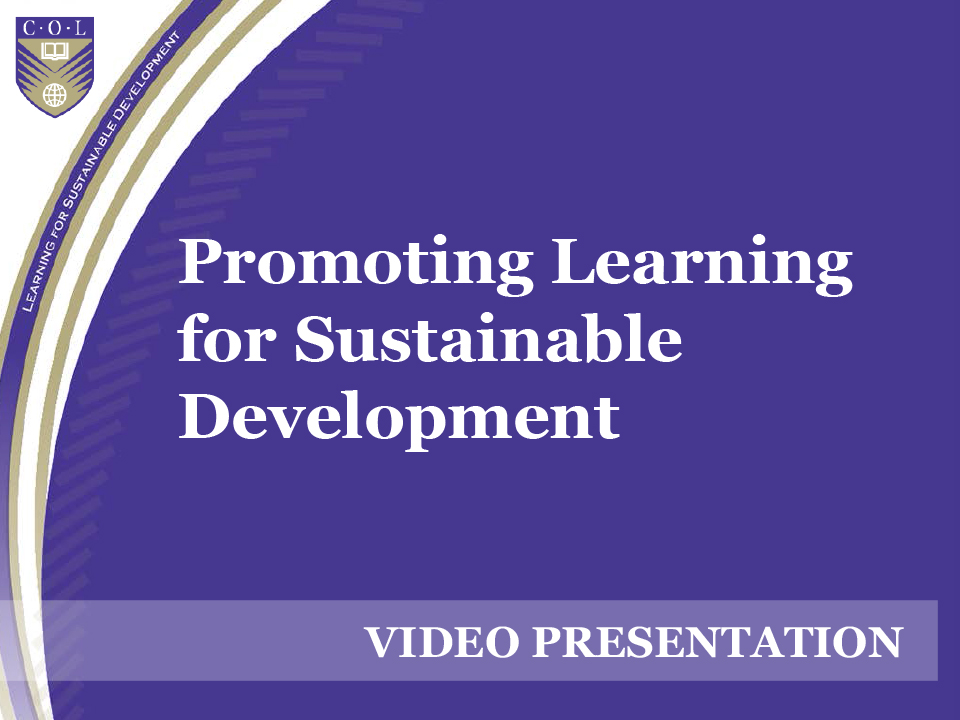
Excellencies, Senior Officials, Colleagues. Thank you for the opportunity to present my organisation, the Commonwealth of Learning or COL. Let me explain who we are and what we do.
COL is an intergovernmental organisation established by Commonwealth Heads of Government when they met in Vancouver for CHOGM 1987. Ever since, we have been in beautiful British Columbia, which makes us the only Commonwealth intergovernmental organisation that is not in London
Our mission is to help Commonwealth member states and institutions to use technologies for expanding access to education and training.
COL believes that learning is the key to sustainable development. Learning must lead to opportunities for economic growth, social inclusion and environmental conservation.
This aligns closely with Goal 4 of the 17 SDGs identified. This standalone goal on education focuses on ensuring inclusive and equitable quality education and lifelong learning opportunities for all by 2030.
The global community is concerned about the availability of financial resources to achieve the targets identified. As we know, finding adequate finances will always be a challenge. Harnessing the potential of existing and new technologies can help us to achieve learning for sustainable development in a more cost-effective manner.
Let me demonstrate this with our work which is organised in two sectors: education and skills.
As countries achieve success in providing universal primary education, there are still significant barriers preventing many young people from entering secondary education. Open schools can provide flexible learning opportunities through the use of open and distance learning which uses a range of technologies from print to the internet. A COL study shows that the Namibian College of Open Learning costs one fifth of what it costs to put a student through government schools. COL is working in 22 countries to promote this. This young woman from Bangladesh says ‘I left school at the age of 12. I am 22 now and have 3 children. I went back to school so that I could help my children with their schoolwork’.
Well-trained teachers are critical to improving the quality of education. COL uses a range of technologies including MOOCs, to train and retrain teachers. In partnership with the African Virtual University, COL offered a MOOC for teacher training, in which over 1600 teachers from 10 countries enrolled , making this a very cost-effective option.
Improving access to quality Higher Education continues to remain a priority for many developing countries. COL’s Commonwealth Executive MBA programme is offered in 11 countries and the 27000 persons who have enrolled in this programme have improved access to livelihoods opportunities.
Commonwealth Ministers of Education directed COL to establish a Virtual University for Small States (VUSSC). Over 53,000 persons have been trained under this initiative in 31 small states. Environmental sustainability is a central concern for many of these states. Here is a graduate of the VUSSC programme on Sustainable Agriculture at the National University of Samoa.
Skills development is a major priority for most governments. Working with the Ministry of Education, Nauru, COL supported a training programme on working with concrete where 167 young people qualified this has opened up livelihoods opportunities for them.
Millions of farm families do not have access to learning in developing countries. COL offers a new approach called the Lifelong Learning for Farmers. This unique programme has lifted thousands of farmers out of poverty. For every dollar invested, income and assets worth $9 have been generated among these farmers, who became lifelong learners using basic mobile phones.
COL leverages its impact through partnerships. UNESCO has identified a high-level competency framework for teachers and COL developed the complementary resources to train teachers. Here are the graduands of the Commonwealth Certificate in Teacher ICT Integration in Antigua and Barbuda.
COL recognises that the achievement of gender equality is central to its agenda of learning for sustainable development. These are the farmers and extension officers at a workshop in Jamaica.
Many governments have introduced tablets in their schools. But what is also needed is connectivity, content and capacity. How do we reach children under this tree, who are far from the electric grid and internet connections?
Aptus or the Classroom Without Walls is one possible solution. COL has developed it by using readily available and low cost components, and it costs about $ 100. Aptus does not require power from the mains. We can use solar chargers instead. It does not require any connectivity. We use a wireless router. All this enables teachers and students to access good quality digital materials, through this device.
The Hon Minister of Education, Vanuatu presented Aptus to his officials for deployment in remote island schools. During the 19th CCEM, Ministers commended the key role of the Commonwealth of Learning in driving innovation.
These, in short, are some of the things we do.
COL commissioned an external evaluation to assess its impact over the past nine years and the report says that ‘COL has had a major impact on individuals, institutions and community based organisations – is a highly respected flexible and nimble organisation’.
As we have seen, learning will be central to achieving sustainable development. We could think of introducing a parallel forum on Education in the wings of future CHOGMs. COL, has been mandated by Commonwealth Heads of Government to support education and learning through the use of technology, and we will be honoured to facilitate the proposed Education Forum.
With that let me thank you for your kind attention.


